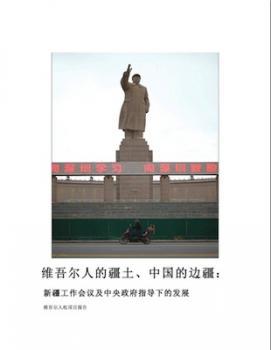维吾尔人的疆土,中国的边疆:新疆工作会议及中央政府指导下的发展

立即发布
2013年 2月27日;美国东部时间:10:20
联系:美国维吾尔人协会;+1 (202)478 1920
维吾尔人权项目即将发布:维吾尔人的疆土,中国的边疆:新疆工作会议及中央政府指导下的发展为题的中文报告。该报告英文版发布于2012年6月;本报告检审始自2010年新疆工作会的,由中国中央政府指导下在东突厥斯坦实施的史无前例的投资发展政策及其后果。维吾尔人权项目试图通过该报告揭示两年来新疆工作会议实施政策的本质。报告维吾尔人的疆土,中国的边疆:新疆工作会议及中央政府指导下的发展,审视了北京领导人硬性制定的,在被维吾尔人视为自己疆土、而被汉人视为事关中国经济发展重要疆土区域落实其政策的效果。
新 疆工作会议制定政策焦点为自然资源开发、基础设施建设、拆迁、商贸促进、税务改革以及资本投入及中国东部人员流入等。但是两年过去了,中国政府还未能建立 起一个有效监督、评估如此巨大的跨区域发展工程的机制。中国领导人到目前为止,也还未能解释清楚用于评估政策落实情况的要达目的,如果可能还有什么政策目 的的话。类似于过去毛主义激进政策的执行,对西部大开发运动的监督、评估的持续缺失;使中央和地方领导过去两年来只依赖由上而下的发展政策实施,刻意忽略 一份清楚分明的分析这些发展政策对基层影响的蓝图。
新疆工作会议的突然举行,暗示中国官方对在该区域实施的发 展政策,未能达到其预期消除发展不平衡的不情愿的承认。主要由维吾尔人及其他非汉民族遭受的、政策失误导致的不平等后果,促发了震惊世界的2009年该区 省会城市乌鲁木齐的骚乱。然而,新疆工作会议制定的政策还是仍然没有反思引发骚乱的不平等、民族歧视政策。乌鲁木齐骚乱三年后,该区域的发展政策仍然回避 建立适当的能够评估、减缓影响该区非汉族群经济境况因素的、如;收入分配不平等、高贫困及招聘歧视等的机制。核心问题在于;在制定、落实该区域发展政策 时,忽略与维吾尔及其他非汉民族的协商。
维吾尔人的疆土,中国的边疆:新疆工作会议及中央政府指导下的发展 记录了新疆工作会议的发起、还是未能在该区民众中实施公平分配发展硕果的政策失败。除非区域发展发起中的错误得到纠正、悬殊的不平等得以正式,发展政策的未来仍是疑问。
根据报告的发现;维吾尔人权项目对中国政府、其他有关实体提出了一些建议。对中国政府的建议如下:
- 根据中国《宪法》、《民族区域自治法》、《劳动法》及《促进就业法》,彻底消除在政府机关、新疆生产建设兵团招聘中存在的就业民族歧视。
- 除了进行东突厥斯坦不同地区失业统计数据的搜集研究外,还要进行不同族群间失业率、收入不平等状况及贫困率的统计数据搜集研究,并公布研究结果。
- 建立评估措施及实体,以便公民社团监督。如:中期实施目标及独立监督机构;用于系统、公开评估在新疆工作会议旗帜下实施发展政策的效果。
本报告维吾尔人的疆土,中国的边疆:新疆工作会议及中央政府指导下的发展,可以有以下连接下载:
https://docs.uhrp.org/Uyghur-Homeland-Chinese-Frontier-Work-Forum-Chines…
The Uyghur Human Rights Project (UHRP) issues a Chinese-language version of its report Uyghur Homeland, Chinese Frontier: The Xinjiang Work Forum and Centrally Led Development
For immediate release
February 27, 2013, 10:20 am EST
Contact: Uyghur American Association +1 (202) 478 1920
The Uyghur Human Rights Project (UHRP) is releasing a Chinese language version of its report Uyghur Homeland, Chinese Frontier: The Xinjiang Work Forum and Centrally Led Development. The report, published in English in June 2012, examines the effects of the Xinjiang Work Forum, held in May 2010, which heralded an unprecedented state-led development push in East Turkestan. In this report, UHRP strives to provide an overview of the nature of development policies put in place in the two years since the Work Forum. Uyghur Homeland, Chinese Frontier: The Xinjiang Work Forum and Centrally Led Development considers the consequences of development that is mandated by leaders in Beijing in a region Uyghurs view as their home but Chinese view as territory vitally important to the economic growth of the People’s Republic of China (PRC).
Policies adopted at the Work Forum focused on natural resource extraction, infrastructure projects, demolitions, trade promotion, tax reform and the transference of capital, investment and personnel from eastern areas of the PRC. Two years later, the Chinese government has yet to put in place a system to effectively monitor and assess the progress of these region-wide initiatives. Chinese officials have not clearly stated what targets, if any, they are using to measure the effects of their policies. In an echo of Maoist policies of the past, and a continuance of the failure to monitor the progress of the Great Western Development Drive, central and regional Chinese leaders have in the past two years relied upon top-down development while neglecting to lay out a clear blueprint for analyzing its grassroots effects.
The Xinjiang Work Forum was prompted in large part by the tacit acknowledgment on the part of Chinese officials that economic policies in the region had failed to bring about their desired results, such as developmental parity. Inequalities stemming from the failure of these policies, the effects of which were borne largely by the region’s Uyghur and other non-Han populations, contributed to the turbulent unrest that shook the regional capital of Urumchi in July 2009. However, the policies designed at the Work Forum have largely left unaddressed the same inequalities and discrimination that helped lead to the unrest. Three years after the turmoil in Urumchi, development strategy in the region remains devoid of an adequate framework from which to evaluate and mitigate economic conditions impacting the non-Han community, such as unequal income distribution, high levels of poverty, and hiring discrimination. At its core, regional development is plagued by the lack of consultation and participation of Uyghurs and other non-Han residents regarding the formulation and implementation of the policies that affect them.
Uyghur Homeland, Chinese Frontier: The Xinjiang Work Forum and Centrally Led Development documents the ways in which Work Forum initiatives have failed to ensure the equal distribution of the benefits of development among the region’s population. Until the flaws in regional development initiatives are remedied, and stark disparities are addressed, the future success of development in East Turkestan will be left in question.
Based on the findings of this report, UHRP provides a number of recommendations for the Chinese government and other entities. These include recommendations for the Chinese government to:
- Eliminate ethnic discrimination in the hiring process for employment opportunities in the state sector and the Xinjiang Production and Construction Corps (XPCC), according to the Chinese Constitution, the Regional Ethnic Autonomy Law, the Labor Law and the Employment Promotion Law.
- Undertake research to compare unemployment conditions, income disparities and poverty rates among ethnic groups in East Turkestan, in addition to researching and comparing unemployment conditions among different regions within East Turkestan; and make the results of such research public.
- Establish measures and institutions that can be monitored by civil society, such as interim targets and an independent monitoring body, to systematically and transparently evaluate the effectiveness of development initiatives carried out under the banner of the 2010 Xinjiang Work Forum.
The Chinese report, Uyghur Homeland, Chinese Frontier: The Xinjiang Work Forum and Centrally Led Development, can be downloaded at:
https://docs.uhrp.org/Uyghur-Homeland-Chinese-Frontier-Work-Forum-Chines…
即将发生的事件
「新疆公安档案」究竟揭示了什么:这一年来对海外维吾尔人的影响
加入维吾尔人权项目的线上活动,讨论「新疆公安档案」的揭露以及这一年来对海外维吾尔人的影响。这些档案与其中展示的证据,将中国政府对不论老幼的无辜维吾尔人执行的任意拘留行动展现给世人所见。
